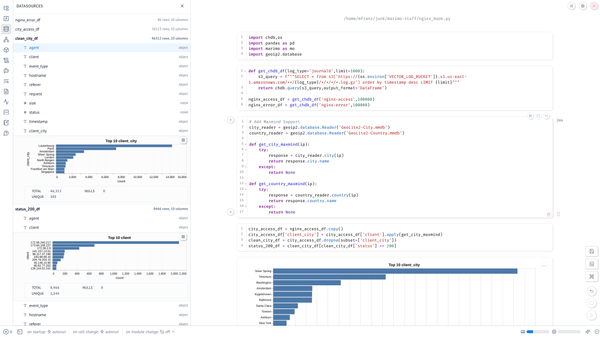Reflecting on the Top Ten Seth Godin Quotes from The Song of Significance
At some point in the past decade I started reading Seth’s Blog. I can’t say that I read it regularly, but I still keep reading it.

At some point in the past decade I started reading Seth’s Blog. I can’t say that I read it regularly, but I still keep reading it.
That is a good way to think about approaching his latest book.
Although it not dense and not long (and it would have been possible to read in a single sitting) I didn’t. I’ll be honest, I sometimes really struggle with books created from blogs — or that appear that they were created from a blog. They seem too “light.” Not substantial enough. Too confessional. But writing is writing and it is always hard, but somehow turning a blog into a book seems like cheating. (Although it is not and Managing Humans: Biting and Humorous Tales of a Software Engineering Manager is an obvious example of a blog-borne book that just works.)
I felt that a lot while reading The Song of Significance. What was I missing? Was there more to it? I certainly wanted more.
But I kept reading.
Texts do not really stand alone. The Text is part of history (meaning a point in time and space) and the reader’s context.
The words remind us of what we’ve read before and what we have written. Or could have written. This is how we make meaning — well, if you buy “Reader-Response Theory.” On it’s own, I wouldn’t recommend spending the $13.99 (Kindle Price) to buy this book. But at the time and place where I am at (and where we are it) it is worth reading.
It is important as part of a larger conversation about work and the role that leaders play in in organizations — or should play, in this troublesome decade where a lot of us are questioning why we work and challenging corporate conceptions of how we should work. The Raw Signal Group blog is another space where these questions are being explored as well as in their books which I’ll mention below.
Released in early June, written after the Pandemic, well into the Tech Correction (or whatever is happening now) The Song of Significance speaks to the crisis of meaning in the workplace that many of us are feeling, regardless of where we are in our careers and how long we’ve been “at work.” I was also reminded of President Obama’s Working: What We Do All Day that I blogged about a earlier in the year.
Something is definitely up. We are reconsidering what we we do and why in this decade. We’ve been through the phase of “Essential Workers” and “The Great Resignation.” We’re past “Quiet Quitting.” We are still debating Return To Office. Unions are back, if you believe Bloomberg News. And some people just “want to work anymore.” Or so they say.
If you just read Godin’s work superficially, you might not get much out of it. But if you read it alongside other leadership books in this decade and use it as a starting point for exploration, it will be a lot more valuable. But isn’t this how we should read anyway?
I read Song of Significance alongside 3 management books written post-2020. These are important books if you haven’t read them.
- Unmanageable: Leadership Lessons from an Impossible Year by Jonathan and Melissa Nightingale.
- Becoming a Leader in Product Development: An Evidence-Based Guide to the Essentials by Ebenezer Ikonne.
- Leadership in Complexity and Change (For a World in Constant Motion) by Sharon Varney.
Two of the three definitely are strongly set of the 2020s, in this VUCA decade. Unmanageable is the closest in style and format (also blog-like) but many of the concepts Godin explores in this book are treated in more detail in Leadership in Complexity and Change. Informed by research on complex adaptive systems, Dr. Varney introduces the concepts of dyanmic patterning, stability and change, in how teams responded in March 2020.
I went through my Kindle highlights and picked the Top Ten, because as a Gen X I grew up watching David Letterman of course!
3. The Best Job You Ever Had
What if we built an organization people would genuinely miss if it were gone?
As managers and leaders (I don’t think manager is a dirty word, either, unlike this book and other books) the one way we can assess ourselves is through nostalgia. Years later, would someone miss the team? The work? Or more importantly, the people that did the work? Would we want to work for that boss again? Would we join them on their next endeavor, even though the first memory is a unique moment in time, unlikely to be replicated ever again. Memory is tricky though. We forget things. We forget the things we want to forget and remember the things we want to remember. Because reasons. There is no going back. Even if you go back to that boss. Or to that company (not that I’ve ever been a boomerang) it would not be the same.
55. Relocating the Center
The purpose of a beehive isn’t to make honey: honey is a by-product of a healthy hive. A significant organization can please its customers and make a profit as well. But it begins by earning enrollment and then doing the work to make change happen.
In Song of Significance, Godin returns a lot to the idea of “enrollment.”
This is a funny word. We enroll in a class. We enroll in school. And what does “earning enrollment” mean? Is this because when you hear about a good class (or a good professor) you want to sign up? You wait outside the room, anxious to see what you’ll learn. How many of us start our days like that? What is “the work” we have to do? If we are excited about something we say SIGN ME UP! How many projects or companies can we feel that way about anymore? Do you feel “enrolled” when you drive to the office for the manditory 3 days a week? When you first login to Slack in the morning?
59. What People Want
When confronting the possibility of change, tension arises. Tension is the feeling of wanting to be in two places at once. Often that’s the place of safety, where we know everything will be as it was, versus the place of significance, where we can increase our affiliation and increase or maintain our status.
Change is a funny thing. Change can emerge. This is discussed in Leadership in Complexity and Change. Sometimes change is imposed. The system responds and reacts. Things do not go as planned. The larger the team, the fewer the levers of control. Those decisions to pursue an M&A in for market dominance or placement within a magic quadrant. That top down re-organization. One boss is shown the door. A new boss enters the room without the necessary context they need to make sense of the time and place. This causes tension. Some of us are going through this now. Tension as contradiction? Tension as things that aren’t spoken that need to be spoken. Tension as realizing things are temporary and we don’t know where we will be? Will we have a job in a month? Which of our co-workers will be gone?
I don’t think this is the kind of tension Godin means. What I think he means is like pulling a taut rope. What are the conditions that make people want to change? What makes people accept changes? How is tension different than “slack” described by Tom DeMarco in the book with that name.
85. Standards Instead of Obedience
Obedience is about the passion or power of the manager. Standards revolve around the values of the institution.
I recently read an article on RTO. I’ve heard stories where managers are checking badge logs to determine who is going to work. Who is clocking in? I can’t imagine working in an environment of fear, but I realize this is a privelege. Not everyone is so lucky.
But this idea of standards — or principles is important to think it about it. Is isn’t just about the boss’s preferences or opinions. This is where systems come in. Within a denominational church, like the Episcopal Church that I belong to, there is a heirarchy. There are processes. There isn’t the authority of a single, sole preacher — which is often the case of non-denomoniational churches. We have the structure of a liturgy that provides constraints to work within in. Without norms and standards, it is about coersion. Like the fear of getting fired.
Who wants to work like that?
87. Show Your Work
Your opinion isn’t nearly as important as how you came to your decision. Your status in the hierarchy doesn’t matter if you can’t show us your work.
This is an easy one. What is your thought process? Was something debated? Did you get feedback. What questions did you ask, or if you are a leader did you just say, this is my call. This is how it will be? Showing the work means you have to do the work of discernment. Discernment builds credibility in whatever is being built, whether a tool or a team.
97. Professionals Say No
A professional, though, brings insight and reputation to the work. If they’re not speaking up, then they’ve sacrificed the very expertise and authority they worked so hard to earn. When a professional disagrees, alters the plan, or refuses to go along, they are doing the truly hard work of being a professional.
You’ve probably heard that saying that as a leader, you need to start worrying when people shut down and shut up. Yes, I’ve taken liberty with the phrase but I like mine better. Are they still pushing back? Pushing back means that they are engaged and still care. Compliance means they have checked out.
105. Hurt People Hurt People
Significant work involves tension, change, and the transitions of starting and finishing. What we’ve done will change what we do. What we do will change who we are. And the cycle continues. The challenge of leadership is helping people put that history to work in a positive way.
Since I started this blog, I’ve been thinking a lot of about layoffs of the past, present, and future and how this impacts teams and individuals. Starting a job is the beginning. Being let go is an ending. How this is handled by individuals or teams makes all the difference the world, but it can’t be spinning. It has to acknowledge the pain of what people are going through and the loss and grief. To wallpaper over this and not go through it is a recipe for a broken culture.
134. Embrace Uncertainty
But saying it with clarity and intent is powerful. It creates space for others to pitch in. It establishes a need for resilience instead of a guarantee. And it allows us to move forward without pretending that we’re certain. The only honest statement we can make about the future is that we’re not certain. If we can use this as a tool, we’re more likely to create the change we seek. Demagogues play on our insecurity and assure us that they’re certain. It’s tempting to believe them, but it’s clear that they’re as wrong as anyone else.
In this VUCA decade, it is impossible to not feel the power of the unknown, but there are still believers that hold on, that look for simple answers. Beware of overconfidence and those that are convinced that know better and that they known how it will turn out and that the choices are easy.
136. Withold Definition
Naming something is useful when we’re right, but it’s a challenge when we’re wrong. Because the act of putting something into the wrong box will prevent us from understanding what it really is.
In product development there is the concept of the “Big Design Up Front” that is probably wrong, an architecture that is premature. Anyone that has dealt with infrastructure naming conventions knows how hard it is the converge on a standard. That difficulty (dare I say, that tension in 59) means that learning is still going on. There is debate and discussion. There is grappling with an idea that you struggle
144. The Wonder of the Swarm
Our role isn’t to simply fit in or to mimic or to comply. Our job is not to follow precise instructions. The coordinated hum and motion of the hive is a message for each of us, a vivid story about waking up from a culture-induced torpor to get back to what really matters. To not only reclaim the agency that is our humanity, but to open the door for others to find it as well.
I’m running out of words and want to wrap up this blog, so I’ll leave this as the exercise for the read to ponder this one and think about the kind of teams and companies we want to work in and the type of bosses we should be and want to work for!



